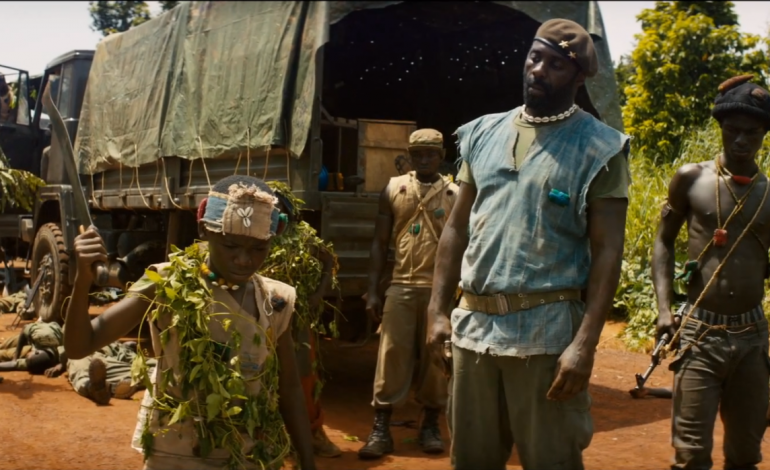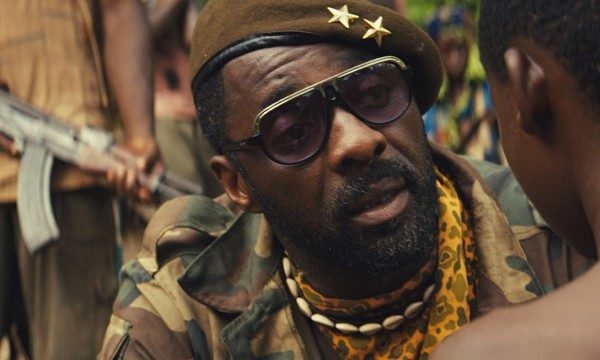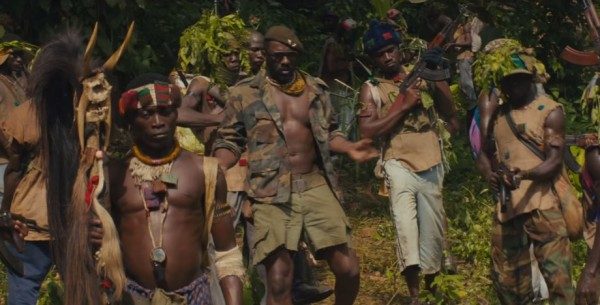

Based on the novel by Uzodinma Iweala, Cary Fukunaga (Jane Eyre, Sin Nombre) writes and directs a brutal and blunt adaptation of Beasts of No Nation.
The film follows the story of a young boy, Agu (Abraham Attah), who lives in a small village with his family in an unnamed African country. After his mother and younger siblings flee to the capital, government forces execute his father and older brother, believing them to be rebels. Agu is able to escape into the jungle and find a new family under the NDF, an increasingly successful rebel faction. The rest of the movie follows Agu’s inscription as a child soldier under the eye of the Commandant (Idris Elba, Thor), and includes scenes of his graphically depicted heroin use, rape and murder.
Although this is far from his best piece, Fukunaga made good choices when it came to the direction and tone of the film. Unlike similar, Hollywood-style movies such as The Last King of Scotland and Blood Diamond, Fukunaga did not include an expendable white man as the main character, but instead chose to focus on Agu’s transformation into a child soldier. This is where Fukunaga is able to take the film to a higher level. While Blood Diamond focused on action and westernized entertainment, Beasts of No Nation seeks to vividly show and inform the audience about the realistic and human consequences of war. Gratefully, some of the graphic scenes are cut short, but the emotional repercussions are enough to pack a powerful punch.
Interestingly, Fukunaga also includes the absence of the “good guys.” Throughout the film, neither the government forces nor the rebel factions are seen as a source of hope; there is simply meaningless violence and killing in search of some end goal that is never articulated. This works as the movie’s main advantage and disadvantage: an ambiguous conflict offers lots of room for interpretation and focus on the emotional and spiritual journey of the soldiers, but fails to offer any details that could have made the movie more enduring and meaningful.
Visually, Fukunaga never disappoints. Beasts of No Nation, along with his other projects, benefits from beautiful cinematography and resonant images. But like most movies, it would be better seen on the big screen rather than on Netflix, where audiences would be more likely to get caught up in the movie’s striking brutality and short bursts of sentiment.
Newcomer Abraham Attah manages to carry the movie well as the main character with great screen presence and subtly moving moments. However, Agu’s fall from innocence is not as gripping and compelling as the character development of Idris Elba’s Commandant. Elba embodies the surprisingly multifaceted character well, introducing himself as a confident, charismatic leader who later goes on to reveal his insecurity and uncertainty as things do not go according to plan.
As the film nears to an end, Agu ponders if he will ever be able to go back to doing “normal boy things” again. A trance-like stupor falls over Agu and rest of the movie, as we reel from the horrifying events that transpired earlier. And just as it seems Agu will remain in this sedated state forever, we are left with a feeling of hope and redemption, that perhaps we can move forward from the past and regain a semblance of a normal life.


Verdict: 3 out of 5
Fukunaga’s failure to include overarching perspective blocks the film from being more memorable, but great performances and emotionally affecting scenes are able to make up for it — mostly.

